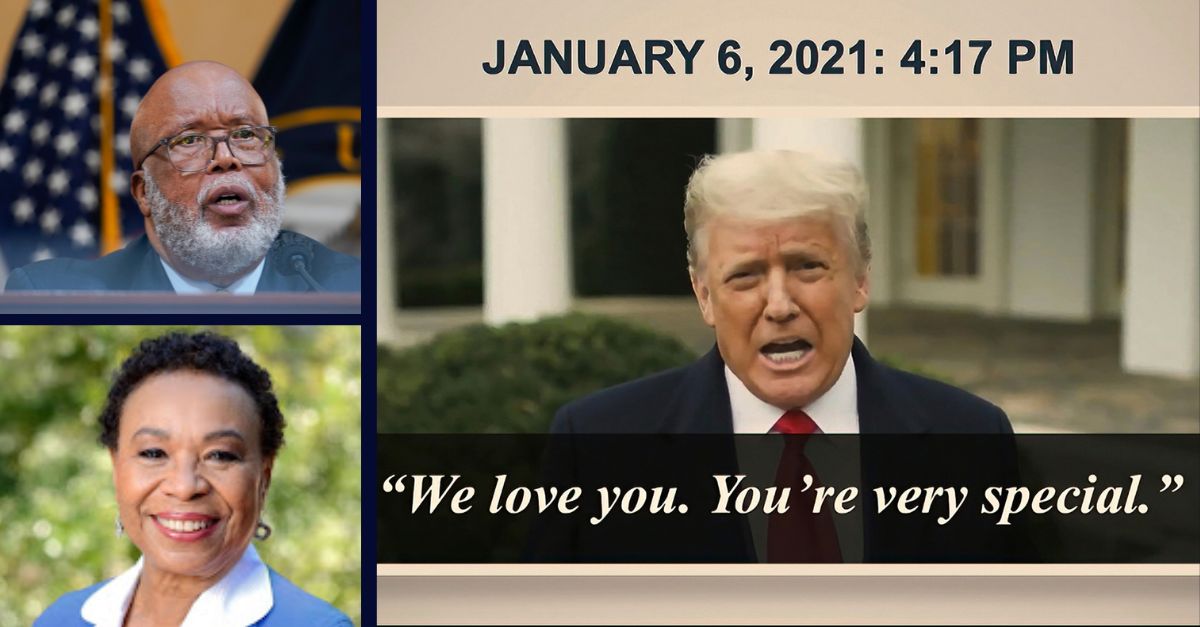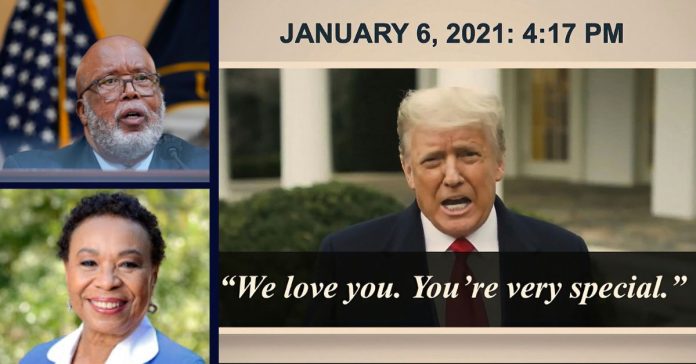
Top left to right: Committee chairman Rep. Bennie Thompson, D-Miss., opening remarks as the House select committee investigating the Jan. 6 attack on the U.S. Capitol holds its first public hearing in Washington, D.C. on June 9, 2022. (AP Photo/Andrew Harnik). In this image from video, a video from Donald Trump is shown to senators during the former president’s second impeachment trial n the Senate at the U.S. Capitol in Washington, Wednesday, Feb. 10, 2021. (Senate Television via AP). U.S. Rep Barbara Lee of California, Profile Photo for Official YouTube.
In a brief expanding on why U.S. lawmakers must be halted indefinitely from suing Donald Trump for allegedly violating the Ku Klux Klan Act on Jan. 6, 2021, by whipping up a mob, attorneys for the former president invoked the “extraordinary public moment” Trump finds himself in as he fends off criminal charges tied to the Capitol assault and, in particular, as he and Special Counsel Jack Smith await a significant ruling from the U.S. Supreme Court about his immunity.
The federal civil claim he wishes to now stay first began in 2021. The case of Lee v. Trump, was brought by a number of lawmaker plaintiffs, including Rep. Bennie Thompson, D-Miss., the former chairman of the now-defunct House Select Committee to Investigate the Jan. 6 Attack on the U.S. Capitol as well as Rep. Barbara Lee, D-Calif., and nine other House members. In addition to Trump, the lawmakers named the since-dissolved Proud Boys organization and its now-imprisoned leader Henry “Enrique” Tarrio, as the former president’s co-defendant in the lawsuit.
They argue that Trump’s use of intimidation in the run up to the certification of Joe Biden’s 2020 electoral win, and on Jan. 6 itself, was not part of his official role as president and his conduct directly infringed on their abilities to discharge their official duties. Many of the lawmakers are people of color and it is notable that the statute they are suing under is a Reconstruction era law from 1871 put into place to respond to the predatory practices that the Ku Klux Klan and similar hate-based organizations used to cow members of Congress during that time. Special counsel Jack Smith has also charged Trump under this statute in the criminal case.
The U.S. Court of Appeals for the District of Columbia ruled last December that Trump was not entitled to “official act immunity” from the lawmakers’ specific claims and when the former president had his chance to appeal that ruling to the U.S. Supreme Court, he missed the deadline to do so in February.
With only so many escape paths left to free himself of the lawmakers lawsuit, the April 2 reply brief to U.S. District Judge Amit Mehta pits the former president’s looming — but also delayed — criminal trial in Washington, D.C., against this matter while simultaneously pitting both against the certainty of what the U.S. Supreme Court will say — or how fast they will say it — once oral arguments on his immunity question are held on April 25.
Trump’s attorneys seek Mehta’s sympathies by invoking the pressures the former president faces.
The circumstances, they argued to the Barack Obama-appointed judge and former public defender, are similar to those the nation’s high court has already deemed an “extraordinary public moment.”
“[A]n indefinite stay is appropriate in this case,” the brief argues. “The Supreme Court has advised, ‘especially in cases of extraordinary public moment, [plaintiffs] may be required to submit to a delay not immoderate in extent and not oppressive in its consequences if the public welfare or convenience will thereby be promoted.’ This case — which concerns the first prosecution of a former president and the first prosecution of a major party nominee for President while campaigning for office — presents such an “extraordinary public movement.”
The presumed spectacle and novelty aside, Trump emphatically objected as well to a series of stipulations that he says the lawmakers’ lawyers have proposed that would designate his Twitter account as “personal” when it is used in evidence.
“Accepting plaintiffs’ contention in this case would have repercussions for President Trump’s criminal case [being prosecuted by Smith] where he has asserted that his Twitter posts fall within the outer perimeter of his official duties,” the brief states.
As Law&Crime reported last month, Trump has already asked the court to stay this civil litigation because it could encroach on his Fifth Amendment right against self-incrimination when he squares off with Smith. Attorneys for the lawmakers have rejected this, saying that while they acknowledge need for protections, there are ways they could prepare discovery that would limit or narrow materials or questions that would avoid that very risk.
“But this focus on specificity misses the point,” Trump’s lawyers wrote on Monday. “Given the common nucleus of factual and legal allegations in this case and the Special Counsel’s case, admissions that may at first blush seem innocuous may provide a ‘link in the chain of evidence’ that the Special Counsel uses to bolster his case.”
Trump’s attorneys continued:
This risk is highly prejudicial to President Trump, who, in the absence of a stay, must risk either staying silent and hurting these civil cases or speaking and risking his testimony being taken out of context or spun in a way that is harmful to his criminal defense. The best way — and the only way, consistent with the importance of President Trump’s liberty interest in his criminal matter — is to stay these proceedings while the criminal case is pending.
The plaintiffs and judge should disabuse themselves of concerns they might have that evidence in the case might go missing or be destroyed or spoiled, the filing argues.
Though Trump is facing an altogether separate indictment in Florida for allegedly illegally retaining classified and top secret documents, his reply brief called those concerns a “baseless and insulting insinuation.”
“This is a serious accusation that requires serious proof. But Plaintiffs provide no evidence that this has or will occur in this case, nor any plausible inference for how or why this could occur. The core events at issue in this case have been investigated by the January 6 Committee and the Special Counsel in preparing his criminal indictment. Plaintiffs provide no explanation for how or why relevant inculpatory evidence (a) has been overlooked by these investigations yet (b) both exists and (c) is likely to be destroyed between now — three years into these proceedings — and the end of President Trump’s criminal trial — which, again, concerns the same operative events,” wrote attorney Gary Lawkowski.
In any event, Lawkowski continued, if the Supreme Court fails to adopt Trump’s position — “and it should,” he wrote — any explanation it will give will be directly relevant to the lawmakers claims’ here and now. Further, any distinction the high court makes in its ruling between civil and criminal immunity — “which it should not,” Lawkowski urged — will have implications for civil immunity and vice versa.
Attorneys for the parties did not immediately respond to request for comment Tuesday.
Meanwhile, the lawmakers filed their response Tarrio’s request that he join Trump’s motion to stay the civil proceeding until Trump’s immunity question is resolved. Tarrio, they said, made too vague of a claim and this, they argue, is something Tarrio has already admitted.
Have a tip we should know? [email protected]

